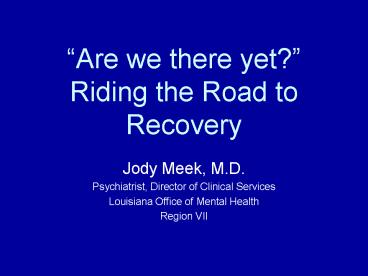Are we there yet Riding the Road to Recovery - PowerPoint PPT Presentation
1 / 25
Title:
Are we there yet Riding the Road to Recovery
Description:
Outsiders/people who Don't follow the rules. Civil Rights Advocates ... Readiness often occurs only in retrospect after they have done something successfully. ... – PowerPoint PPT presentation
Number of Views:53
Avg rating:3.0/5.0
Title: Are we there yet Riding the Road to Recovery
1
Are we there yet?Riding the Road to Recovery
- Jody Meek, M.D.
- Psychiatrist, Director of Clinical Services
- Louisiana Office of Mental Health
- Region VII
2
Adapted FromMark Ragins, MDRoad to Recovery
- http//www.village-isa.org/Ragin's20Papers/Road2
0to20Recovery.htm
3
(No Transcript)
4
Why did Recovery Win?.... Passionate people.
- 12 Step/Substance abuse
- Consumer movement
- Psychiatric Rehabilitation
- Outsiders/people who Dont follow the rules
- Civil Rights Advocates
- Staff who came to the field for personal reasons
- People who are doing Gods work.
5
SAMHSAs Consensus Statement
- Mental Health recovery is a journey of healing
and transformation enabling a person with a
mental health problem to live a meaningful life
in a community of his or her choice while
striving to achieve his or her full potential.
6
(No Transcript)
7
Chronic vs. Acute Illnesses
- With acute illnesses, it is reasonable to
withdraw from life while being treated, whereas
with chronic illnesses the patient should try to
maintain their normal life while being treated. - The ongoing symptoms of chronic illnesses often
make it hard to maintain a normal life,
necessitating rehabilitation to increase
function, personal adaptations to cope, and
community adaptation to maintain access to life.
8
Chronic Illnesses
- Chronic illness more often than acute illnesses
affect peoples self identity. - Hope is more difficult to maintain for both
patients and professionals with chronic illnesses
because the symptoms resist treatment and
helplessness settles in.
9
Making Recovery Concrete
- Recovery from acute conditions usually results
from symptom relief. - Recovery from long term conditions usually
results from - Being able to maintain wellness and
responsibility for self-care - Being able to replace professional supports with
natural supports - People with long term conditions with persistent
symptoms are those most in need of recovery based
services
10
(No Transcript)
11
(No Transcript)
12
(No Transcript)
13
(No Transcript)
14
(No Transcript)
15
Recovery Stages
- Hope - believing the future can be better
- Empowerment - believing you can make a better
future - Self-Responsibility - Taking actions to make the
future better - Achieving meaningful roles - building a life in
the community of your choice
16
Hope
- During times of despair everyone needs a sense
of Hope. - Without Hope there is nothing to look forward
to.
17
Hope
- More than just an ideal- It has to take form as
an actual, reasonable vision of what things could
look like if they were to improve. - They need to have a clear image of the
possibilities before they can make steps to
achieve it
18
Empowerment
- Focus on things that they can do for themselves
not what people can give them. - To be empowered, they need access to information
and an opportunity to make their own choices. - Sometimes they need encouragement someone to
believe in them!
19
Empowerment
- Readiness often occurs only in retrospect after
they have done something successfully. - Waiting till they are ready to move can be
stagnating and disempowering. - Often people have to experience success before
they believe they can be successful. - Nothing is as empowering as a paycheck!!
20
Self Responsibility
- Taking responsibility for their own lives
- Take risks, try new things, learn from their
mistakes failures - Let go of blame, anger disappointment
associated with MI
21
Self Responsibility
- Break old patterns of Dependancy
- Take charge instead of settling for the ease and
safety of begin taken care of
22
Meaningful Role in Life
- They must achieve a meaningful role in life that
is separate from the illness. - It is important for people to join the larger
community interact with people who are
unrelated to their mental illness - Get a Life
23
(No Transcript)
24
- Recovery is not a destination . . .
- its the journey.
25
- Over the years I have walked many paths with our
members. Some of them stay in one spot, going
over and over the same ground, pounding it into
barrenness. Some of them take the all too
familiar and disastrous path of substance abuse.
And, some of them begin to walk, usually
hesitantly at first, but after fits and starts,
with increasing confidence on paths that improve
their lives. - Mark Ragins, M.D.































